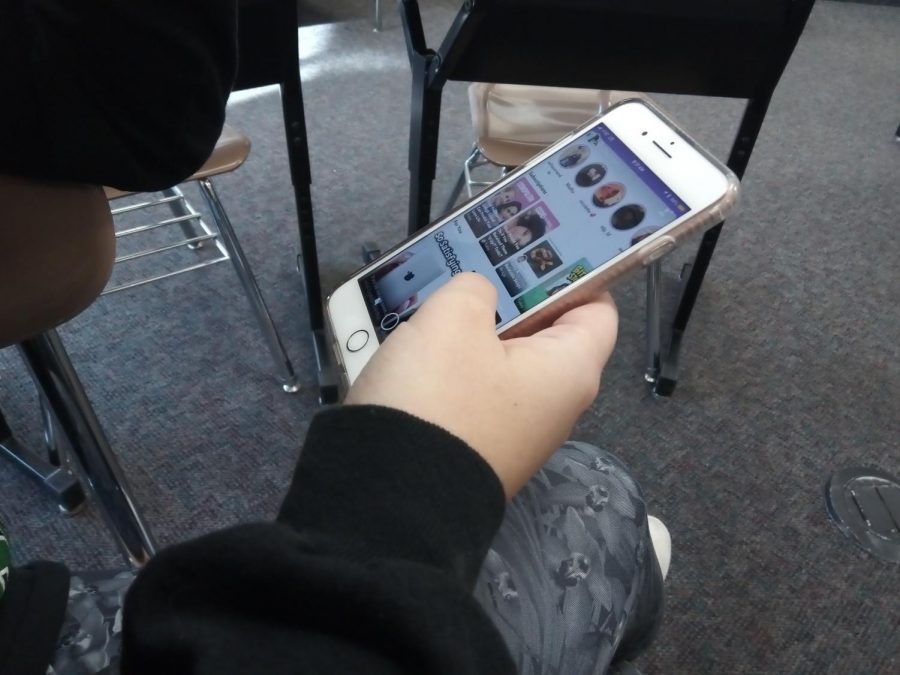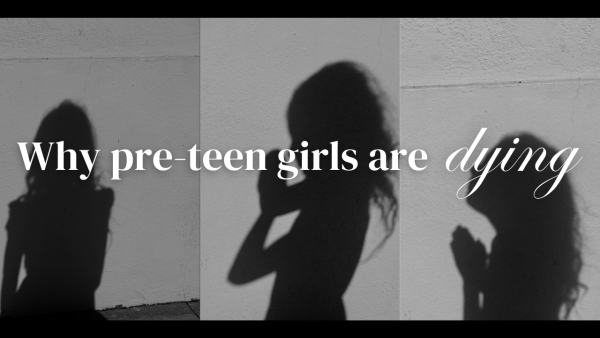It’s okay to step away from the screen
Student photographed on the social media app “Snapchat”.
Whether you’re going into a classroom or walking along the street, you will see heads hanging down, with their eyes glued to the screens of their cell phones. People become sucked into this world of make believe as they log onto Instagram, Snapchat, and any other platform. We tend to compare our lives to others when we go onto social media, trying to prove our lives are perfect and care free. In reality, we care too much about validation by likes and comments. This is taking a toll on the mental health of our society.
A psychology professor at the San Diego State University discovered that when teens spend five or more hours on social media everyday, they are 71% more likely to be at risk for suicide, compared to those who spend an hour or less on these platforms. This is a major red flag that needs to be addressed. We need to teach people that it is okay to step away from your phone and take care of yourself, even if it seems difficult.
Our generation has become so glued to our smartphones, thinking our life depends on it. Because of this online world that has been created, we have also formed ridiculously high standards for others. According to Child Mind Institute, the fallout from these unrealistic standards can become worse once people go off to college. Since students face more stress and become part of a new environment, they feel pressure to make themselves look perfect around new people.
On social media, everyone seems to present their lives as perfect, but underneath the surface, we are hurting. Most of us are struggling to make it in this world because we have created a reality that is impossible to reach. Child Mind Institution describes this as “duck syndrome”, which has been researched after a spate of suicides at Stanford University. This term refers to “the way a duck appears to glide effortlessly across a pond while below the surface its feet work frantically, invisibly struggling to stay afloat”.
I do not understand how we have morphed our population to believe that interaction on our social media is what matters the most. These social media apps, such as Instagram and Snapchat, have made it seem as if our life is dependent on how many likes our posts get or how many people view our stories. The more we look at the number, the more we dwell on it. We look at other people’s profiles and compare, thinking that the highest number is what we need to achieve. But in the outside world, those mean absolutely nothing.
“Honestly, I think it’s sad that everyone loves to focus so much on numbers and relating that to your amount of worth,” North Penn student Kyra DeStefano expressed. “Kids nowadays have lower self esteem at a young age because of social media and how ‘important’ it is to have a higher amount of likes or followers. That’s the only ‘cool’ thing now, not your amount of happiness or how high your self esteem is.”
“People typically rely on the amount of likes, comments, and followers for sense of belonging or rank in the social hierarchy,” said North Penn senior Isaiah Hill. “In an effort to maximize their rank in society, they develop mannerisms they believe society as a who would generally approve of.”
Our society has made it seem as if social media is a necessity. The second we get off our phones, we become withdrawn and lack in face-to-face communication. But, if we train ourselves little by little, we will see an increase in happiness and mental stability. Remember: giving yourself limits is okay.
All of those likes, comments, and views that you keep dwelling on do not matter in reality. Do not let your self-worth be dependent on social media. It is okay to unplug for a while, because in the long run, you will learn that finding yourself is more important than what someone behind a screen is telling you.
Here is an additional resources for parents and students to help navigate the 21st century world of screen time and its effects: https://www.ask-angels.com/meditation-for-families/?msID=2db96b2c-c3b2-4219-96be-86d01874faca
Sources:
https://www.mindwise.org/blog/mental-health/social-media-social-comparisons-mental-health/
https://childmind.org/article/social-media-and-self-doubt/
https://www.ncbi.nlm.nih.gov/pmc/articles/PMC4183915/
http://www.center4research.org/social-media-affects-mental-health/












